As the global arm of Ant Group, Ant International has steadily been growing its reach in Europe, where its key brands Alipay+, WorldFirst and Antom were major sponsors for Euro 2024. We spoke to Ant International President Douglas Feagin to find out more.


Best known for wallet-based mobile payment platform Alipay, Ant Group is one of the most important payments companies in China. However, less discussed is its global arm Ant International.
Covering cross-border payments infrastructure provider Alipay+, global merchant payment services platform Antom and B2B payments player WorldFirst, as well as the smaller digital wholesale bank Anext, Ant International is headquartered in Singapore and grew out of an initial desire to bring Ant Group’s financial infrastructure to the international market.
“When I first joined [in 2016], we were just taking Alipay, the payment app of Ant Group, international,” explains Douglas Feagin, President of Ant International.
“The Alipay customer wanted to travel around the world. We took them to over 50 countries and enabled payment everywhere, from Italy to the UK, the US and around Asia.”
During this time, the organisation also operated parent company Alibaba’s overseas ecommerce business, including brands such as AliExpress and Lazada. However, it has expanded considerably since then, particularly in Asia where the company now has “a comprehensive merchant footprint”. But crucially, there are more opportunities further afield.
“Today the international business is much, much bigger,” he says. “Europe is a high focus right now because we’ve spent a good portion of the last several years in Asia.
“It’s growing in Asia a lot because digital transactions are growing and things are happening. But here in Europe, we actually need to expand our business more.”
Alipay+: Bringing cross-border infrastructure to digital wallets
While Alipay is a consumer-led product, as with Ant International’s other brands, Alipay+ does not focus on consumers. Instead, it serves as an open cross-border payments ecosystem for local digital banking apps and e-wallets, connecting them to Alipay+’s global platform to enable them to be used to make payments abroad at connected merchants.
At present, there are 30 digital wallets connected to Alipay+, including Alipay itself in China as well as Kakao Pay in Korea, GCash in the Philippines and TrueMoney in Thailand. Together this represents 1.5 billion customers, 500 million of which are using the 29 e-wallets not based in China.
Previously, Ant Group developed this network of digital wallets by direct investment, with 10 of those on the Alipay+ network having been established via joint ventures with local organisations, most of which are based in key emerging Asian markets. This includes GCash in the Philippines, Touch n’ Go in Malaysia and DANA in Indonesia, as well as Paytm in India. However, the company moved away from this approach in the 2020s to instead focus on more traditional open partnering.
“We said let’s just open it up and have an open ecosystem, so anyone who has a wallet we’d like to serve,” says Feagin.
“That’s the mindset that we have today: we’re not really seeking out to invest and build local wallets in different places – we already see that momentum happening. So we’d like to work with the partners to connect them to Alipay+.”
Through Alipay+, wallet customers are able to make payments at connected merchants abroad as if they were using their e-wallet in their own market, with around 14 of the 30 now fully connected to the company’s European merchants. This means that customers of any of these 14 will have the same cross-border payments experience in Europe as each other, with the same payment process as they would have domestically.
To achieve this, Alipay+ works with local acquirers, and often favours large players in each local market to connect with its merchants. In the UK, for example, it works with Barclays, while in Italy it uses UniCredit.
This approach presents an opportunity for local merchants to increase their access to the tourist market, particularly visitors from Asia where most of Alipay+’s longest established wallets are based.
“This is pretty exciting for a merchant. There are a billion people in China and there are hundreds of millions travelling every year. Now all of a sudden through Alipay+, I can accept them, as well as the Korean traveller, the Thai traveller, all these other e-wallets,” says Feagin.
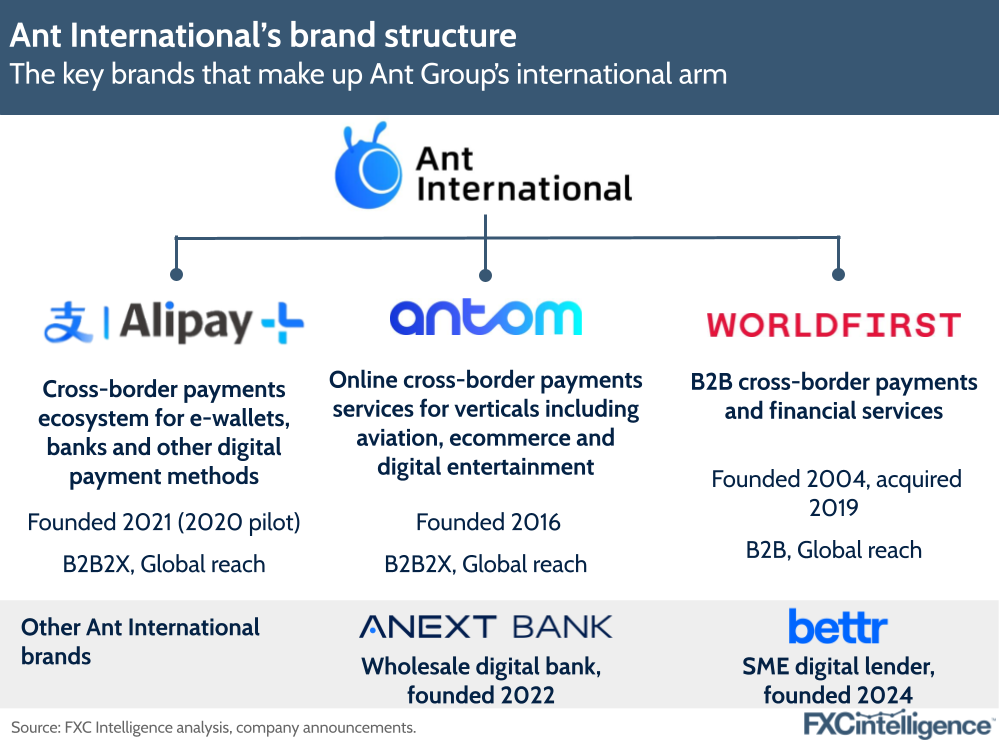
Growing Alipay+ merchants in Europe
At present, the number of merchants Alipay+ e-wallet customers can make payments to skews heavily towards China – there are 80 million merchants on the network in the country – but there are already 10 million and climbing beyond Ant Group’s home, including around 400,000 across Europe.
“We expect that to grow quite dramatically,” says Feagin, adding that much of this initial growth beyond China has been driven by the appetite for travel among Asian consumers following the Covid-19 pandemic.
“We look to continue to expand that to be much bigger because the Asian traveller to Europe is growing post pandemic, and we see more activity here as they continue to expand.”
In Europe in particular, the appeal of rare luxury goods is strong, but high-end products are by no means the only product focus. Alipay+ merchants also include a wide variety of “mom-and-pop stores throughout different cities and countries”, as well as travel-focused merchants such as taxis. This month, Alipay+ partnered with German-headquartered mobility service FREENOW to enable customers of Alipay, AlipayHK and Touch n’ Go to book taxis in seven European countries including France, Germany and Italy.
“Transportation is a key use case and we’d really like to do that much more broadly. In Asia, we actually provide the transportation solutions with ride-sharing and local public transportation, including subways and buses,” he says.
“In China, basically everything can be utilised and we want to expand that in Europe as well.”
The company’s focus on merchant growth in Europe is two-fold. Firstly, Ant International is focusing on the acquirers who are looking to capture more cross-border volume, which Feagin describes as “all the major acquirers across Europe”, and who in turn can help the company connect to local merchants.
“They’re very engaged,” he says. “We’re quite complementary to a lot of the things they do because we do have a differentiated customer base from Asia. So we’ve worked very well with them and have a great partnership.”
Here the most recent example is BNP Paribas, which at the start of July signed a Memorandum of Understanding with Ant International that includes enabling European merchants using BNP Paribas’ acquiring service to accept payments for more than 25 Alipay+ wallets – a move that is bringing thousands of additional merchants into the ecosystem.
Secondly, the company is also engaging with individual brands, particularly those leading luxury brands who see the Asian consumer as a critical growth market.
“We’ll definitely talk with them. They sometimes want to create opportunities for customers to see a new product, the latest line of something, or they want to promote something as a new thing,” he says, adding that brands have the option to add coupons into the customer’s digital wallet to encourage them to engage.
“Say for example, a woman coming from Thailand likes a certain type of dress, we know what she might be looking for. The merchants can then try to place their offers with them. So we’re working to try to connect those merchants digitally and enable a much more fun experience for the consumer to find exactly what they’re looking for.”
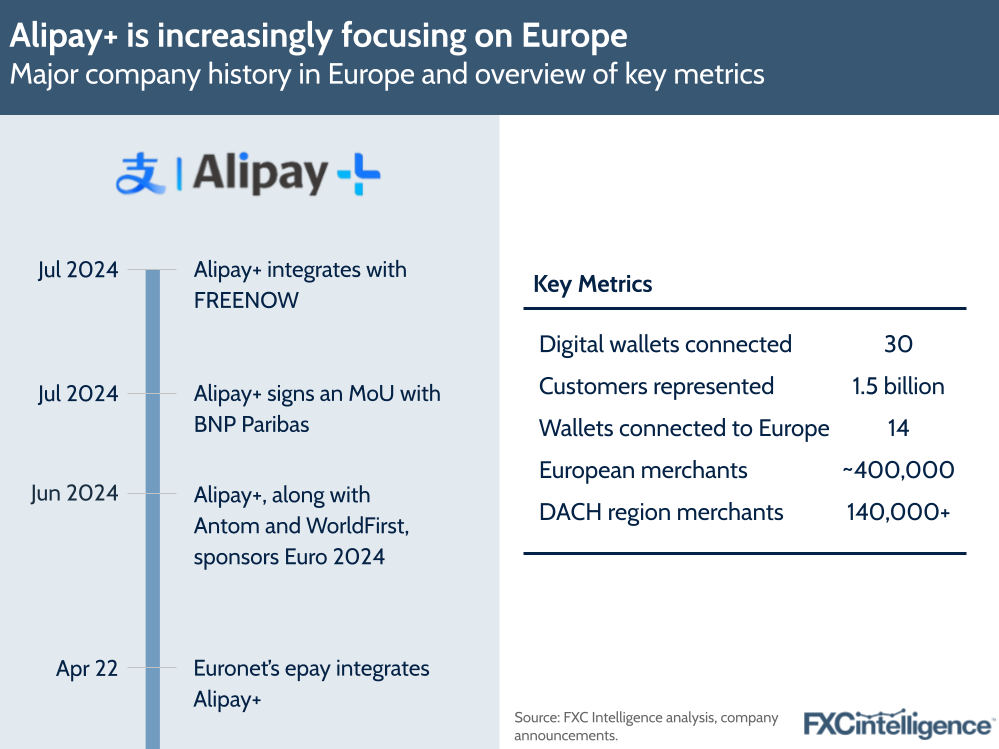
Bringing European wallet and bank partners to Alipay+
While much of the European opportunities for Alipay+ lie in meeting demand from Asian travellers, the company also sees considerable potential in expanding the Alipay+ network to connect European wallets.
“We are very open and want to include more European institutions that have e-wallets or digital bank apps that want to participate in the Alipay+ solution,” says Feagin.
“We definitely want to serve the Asian traveller here, but also any of the other travellers around the world and we do see an opportunity to serve the European customers.
“We’ll do that through our business model, which is working with a local provider to connect to them and enable the cross-border payment properly for them. For the local provider who has a solution and wants to use Alipay+ when their customers travel anywhere, we’d love to do that and we’d love to do that for all different European companies as they grow.”
For customers of European wallets, the appeal is to be able to use their digital wallet both in Europe and when travelling further afield in Asia – a particular benefit in countries such as China where accessing local services can be challenging without use of a local platform.
“If you travel to China, being able to connect through all the Alipay+ solutions into China is very, very handy,” he says. “You can do ride-sharing, you can buy things at food stores, you can pay your hotel, you can ride the subway.”
At present, European players who have connected to Alipay+ include Italy’s Tinaba, but Feagin sees considerable further potential in the region.
“From the conversations I’ve had with a number of the European banks, they’re all introducing interesting new fintech and digitally enabled services and they’re doing that to reach different customer bases,” he says.
“For example, a younger customer base or a different solution where you may not want a full bank account otherwise, but they just want a simple, stored value account and then they can put money on an e-wallet and then go use it to pay.
“We see the development of that here in Europe and we are very excited about the further digital enablement of those solutions.”
Antom: Ant International’s online payments play
While Alipay+ focuses on offline customers, Ant International also services online commerce via its Antom brand – named as a shortening of “Ant to merchant”.
“The Ant to merchant is to go to largely online or digital merchants and help them to connect to many different customers around the world to accept payment,” explains Feagin.
Providing payment and digitisation services across 150 markets and more than 100 currencies, it serves major online marketplaces such as those offered by Alibaba, as well a variety of other key verticals, including via an integration with Shopify. Other focuses include digital goods marketplaces, including gaming and entertainment, as well as online travel agents.
This business arose from Ant’s existing e-wallet capabilities, with the company seeing an under-serving of this area in online payments.
“When we went to the merchants initially, we said, look, we can provide services to help connect you to our e-wallets,” he says.
“That was very well received because they said most of them were primarily focused on cards, so they were serving those customers well, but there were a lot of customers that didn’t have access to a bank account or a card, and we gave them access to that.”
This has proved to be particularly effective in emerging markets where card use is lower, with Feagin giving the example of Indonesia’s DANA wallet, which is reported to have almost 200 million users.
“A lot of them don’t have a bank account, and now they can use DANA to pay online at these merchants. They can buy something on the Google Play Store, or they can buy something on Netflix, they can buy something from Shein, they can buy something from Alibaba. So now they have access to the global marketplace that everyone else had access to before,” he explains.
In Europe, the potential aligns closely with Alipay+: increasing merchant access to an increasingly lucrative Asian market, while also increasing cross-border payment options for e-wallet users in the continent. Here, the company has most recently bolstered its presence in Europe through the acquisition of Amsterdam-based MultiSafepay, a payment service provider that will in particular increase the company’s reach with European small and medium-sized businesses.
With an increasing synergy between online and offline consumer behaviour, Ant International also has the opportunity to support the “omnichannel mindset” that merchants are increasingly taking by supporting them across Antom and Alipay+.
“Merchants say, ‘I want to bring the customer into my store, I also want to be able to connect with them online: I’ve got my website and then I also want to connect with them through digital channels’,” he says.
“We can help them on the digital channel part and the online part, so they reach a broader customer base that way and have a more holistic relationship with them.”
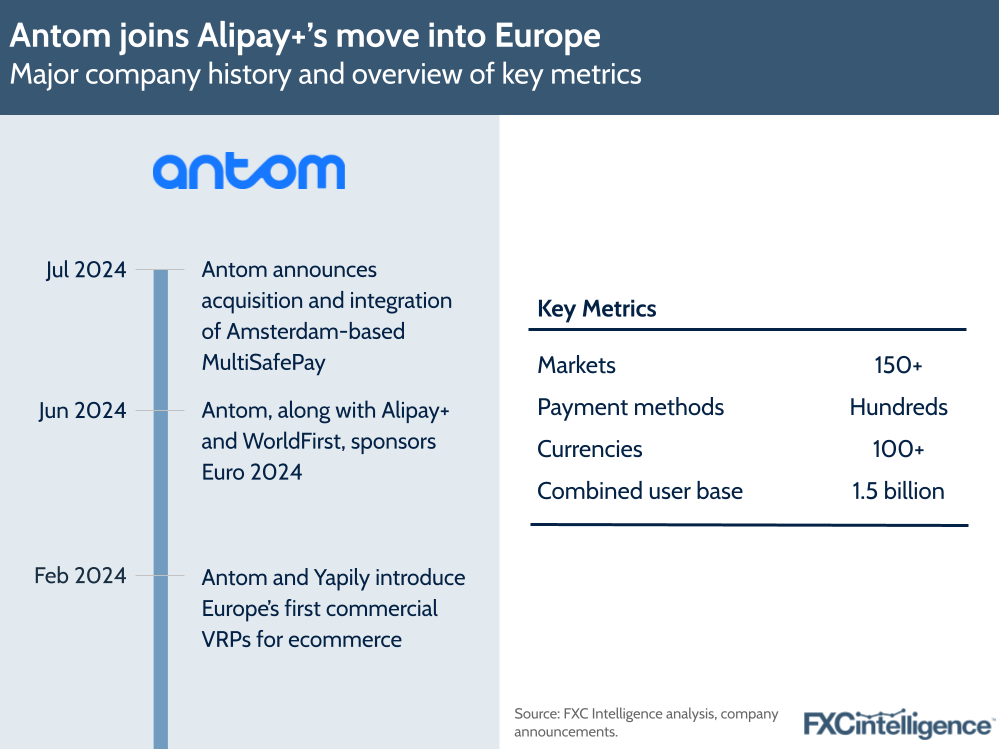
WorldFirst: Adding B2B payments
As a widely known UK-founded provider of B2B payments solutions, WorldFirst is the part of Ant International with the most mature operations in Europe. Acquired in 2019, the company’s services include an all-in-one multicurrency account, as well as marketplace cross-border collections and more traditional cross-border payments.
However, Feagin does see increasing synergies between it and other parts of the Ant International stable, particularly Antom.
“WorldFirst is a distinct product – you have this multicurrency account and you can do business-to-business money transfers – but at the same time, it serves a lot of the same companies that we serve anyway,” he explains.
“A lot of the sellers that are using WorldFirst, we’ll sell their products on ecommerce sites around the world. Those ecommerce sites might actually be Antom clients that we’re providing the payment services for. So there’s a natural fit to that.”
This is being reflected in the company’s deal with BNP Paribas, which also will involve strengthening WorldFirst’s participation in the Single Euro Payments Area.
Crucially, Feagin also sees the customer type WorldFirst caters to aligning well with the broader Ant Group approach.
“Our heritage is serving small businesses. In China we worked initially with the Alibaba ecommerce sites, Taobao and Tmall, but we then expanded rapidly and served the small mom-and-pop shops and mid-sized businesses in their payment needs,” he says.
“It’s very much in our DNA to think about those mid-sized customers and how we can serve their account and payment needs.”
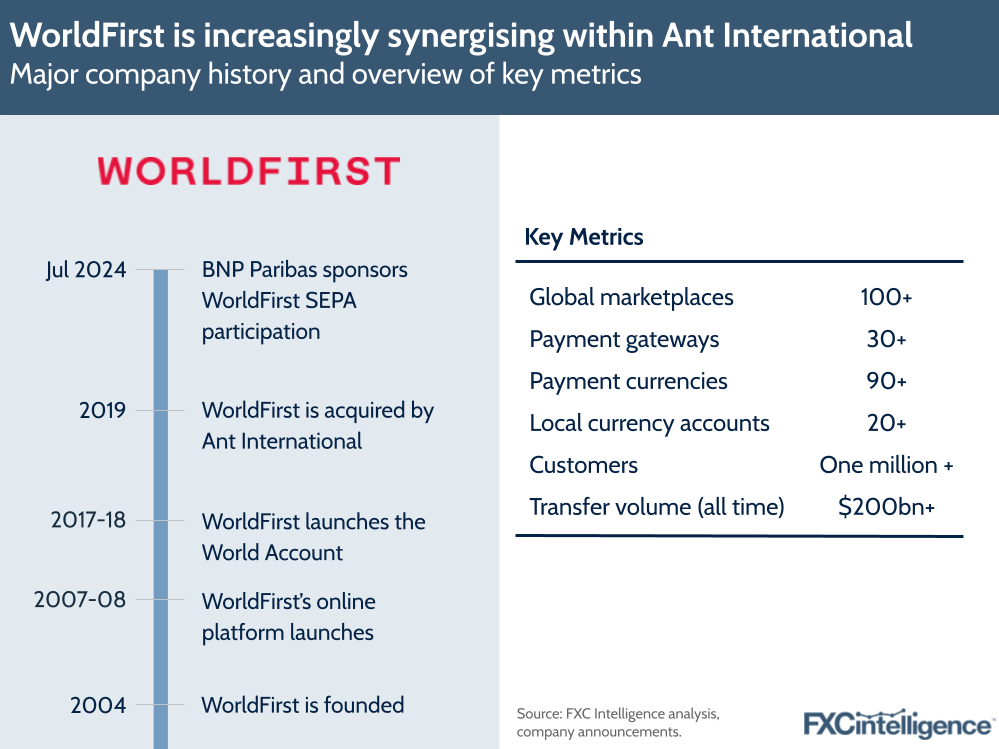
The benefits of sponsoring the Euros
Alongside the high-profile partnership announcements this month, Ant International has also been grabbing attention through its three-way sponsorship of Euro 2024, which has showcased Alipay+, Antom and WorldFirst branding heavily across the tournament.
The biggest event in European football, the Euros are arguably the largest international sporting event to be regularly held in the continent, attracting hundreds of millions of live viewers in Europe and further afield, as well as video views in the billions.
According to Feagin, the sponsorship was driven by Ant Group CEO Eric Jing who “very much loves the sport”.
“Football in particular is one that we see not only has an intense fan base here in Europe, but indeed around the world,” he says.
“That serves our needs because we want to serve the customer in Europe, Asia, Latin America and the US, and there are people following the sport everywhere there.”
The Euros in particular have been an opportunity for the company to grow brand awareness in a region where many remain unfamiliar with the three brands.
“In sponsoring UEFA and the European Championship here, we saw an opportunity to partner with an organisation that was very much aligned with our own interest and that has a broad following,” he says, adding that the event has been a “great thing to sponsor” because it positions the brand logos next to key sporting moments.
“You see them scoring a goal or blocking a goal or whatever it is happening, and it’s quite exciting. We get some good pictures from that, which makes it really, really fun.”
While it is too early to gauge the full impact of the sponsorship, Feagin himself has already seen increased brand awareness in the continent.
“Anecdotally, I’ve seen that just myself going into stores,” he explains.
“I said, ‘Do you accept Alipay+?’ They go, ‘What’s that? Alipay+?’ They see it and they’re like, ‘Oh yeah, is that in the football? I see that there.’ I’m like, yes, okay, good. Marketing dollars well spent.”
Alipay+ has also seen increased flows in the host country of Germany around the tournament, indicating that it has attracted Asian visitors who are increasingly spending via the ecosystem. In the first week of the tournament, Ant International reported that visitor spending via Alipay+ partner e-wallets in Europe had increased 29% YoY.
Meanwhile, the company saw transactions in Germany increase 67% in the opening week versus the previous one. This impact was also felt in Europe more widely, with European Alipay+ transactions increasing 13% week-on-week during the same period.
For Feagin, it’s the start of a broader effort to continue to grow awareness of the Ant International brands.
“We see this as the beginning of much more brand awareness throughout Europe and indeed the world.”
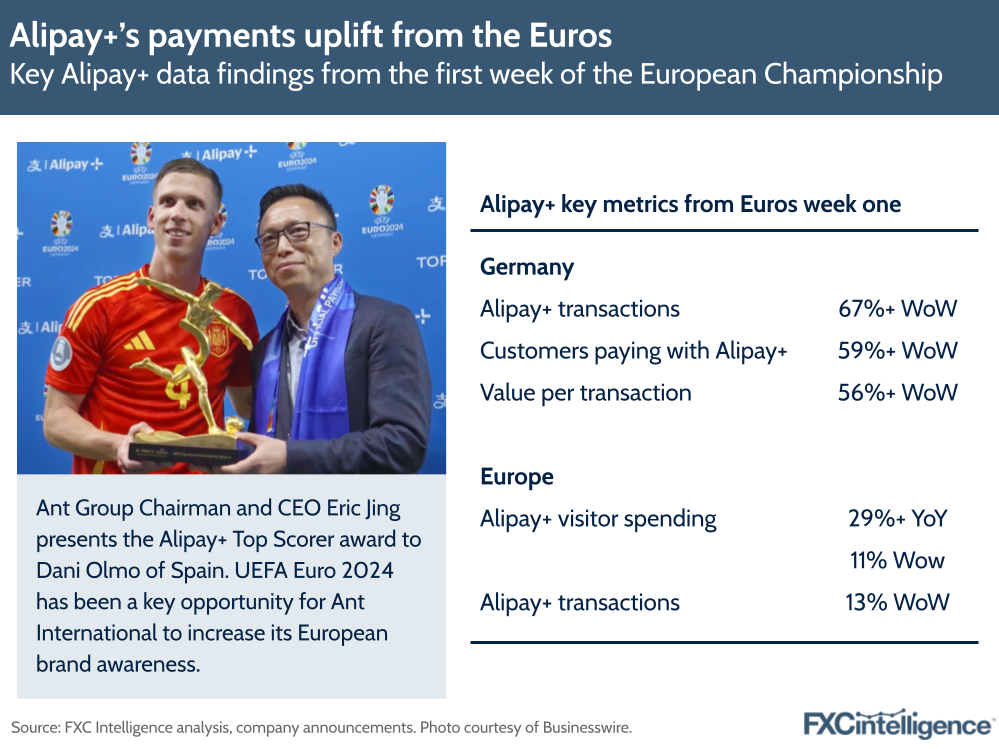
Building on Europe’s potential
Across its three major brands, Ant International is focusing on growing its European presence.
“We have an office in London, we have an office in Amsterdam, we have an office in Luxembourg, where we’re headquartered and the regulator is, and we see great opportunity to expand in Europe,” says Feagin.
“Definitely the Asian traveller coming here, the European merchants who want to use Antom and sell all over the world, we see a big opportunity. Then WorldFirst B2B is big. So they’re all different components of our business.”
As part of this, Feagin says he is “going to spend a lot more time” in Europe, as well as looking to increase the wider company footprint in the continent.
“We see a great opportunity for expansion and we’re going to do that both by putting more feet on the ground here and expanding our business, more connection to European businesses and more connection to European digital channels, institutions that have either e-wallets or digital banks that want to connect with us as well,” he adds.
There are also key opportunities to widen the company’s merchant reach, particularly to cater to increasingly nuanced tastes of inbound visitors.
“We have a very good footprint in the key tourist areas, but there are many more exciting cities for people to visit here,” he says. “The individual traveller is much more prominent amongst the Asian tourists. So they want to explore, they want to find new things.”
However, as he focuses his attention on growth in Europe, Feagin also acknowledges the competitive nature of the payment landscape in the region.
“One of the terms that I think is apt is co-opetition: you tend to cooperate with a lot of different payment providers and you also compete with them,” he says.
“Everyone’s doing their own part of the payment transaction. There are a lot of competitors for digital channels as well – when we talk about enabling digital wallets, we’re not the only ones.”
However, he also sees considerable opportunity ahead.
“We see the payment industry as one that’s becoming increasingly digital and increasingly inclusive, with many more people out there,” says Feagin.
“There are a lot of different competitive flows one way or another in terms of the way people want to pay and want to do things.”


